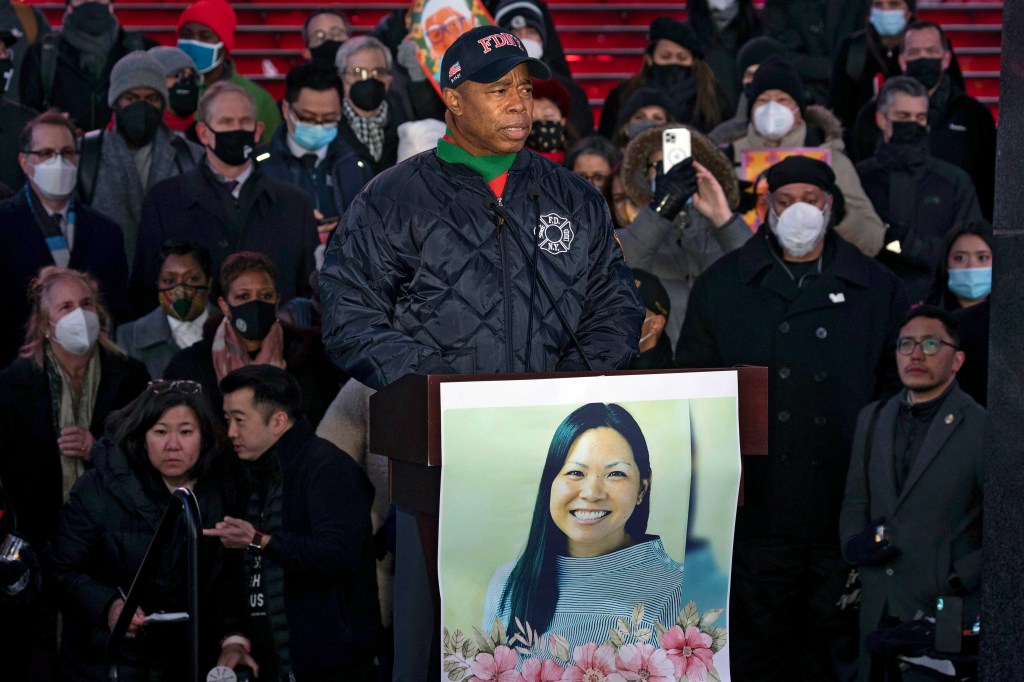While some categories of violent crime have fallen throughout New York City, rates of felony assault have increased, and New Yorkers are struggling to feel safe on our streets. The disparity can be partially attributed to the feeling that crime has become more random with increasing coverage of high-profile, unprovoked attacks, especially in our city’s public transportation system.
Feeding into this cycle is the undeniable connection between the sentiments towards crime and the escalating mental health crisis plaguing our nation. The numbers speak for themselves: an eye-opening 2022 analysis by the NYPD revealed more than 23% of individuals arrested for one of the seven major felony offenses had a documented history of mental illness, with nearly 40% of the offenses taking place in our city’s transit system.
One of these incidents includes the tragic death of Michelle Alyssa Go, who was randomly pushed to her death in front of an oncoming subway train in Times Square in January 2022. A 61-year-old homeless man with diagnosed schizophrenia named Martial Simon admitted to shoving Go. Despite seeking help for his well-documented history of mental illness, Simon spent years bouncing between hospitals, jails, and outpatient psychiatric programs without ever receiving the long-term care he desperately needed and could not afford.
This tragedy highlighted the glaring gaps in our mental health infrastructure that’s allowing far too many to fall through the cracks.
Under a “Transformation Plan” launched in 2014, state psychiatric centers in New York City lost about 15% of their total adult bed capacity, and, according to New York’s Office of Mental Health, the state lost 1,849 psychiatric beds between 2014 and 2022, leaving thousands of people suffering from mental illness to fend for themselves. This problem was exacerbated during the pandemic, when the number of New Yorkers experiencing severe psychological distress increased from 5% to 14%.
To fix this crisis, it’s going to require more than a Band-Aid solution like sending the National Guard into the subways or limited-scope programs like Subway Co-Response Outreach Teams that actively criminalize mental health crises or cause further trauma through involuntary commitment.
We’ve introduced bipartisan legislation, H.R. 8575, named after Michelle Go, that seeks to expand access to psychiatric resources by increasing the number of in-patient psychiatric beds covered by Medicaid from 16 to 36 so long as institutions meet nationally recognized, evidence-based standards of care.
Under current federal law, Medicaid is prohibited from covering long-term stays for patients between the ages of 21 and 64 who are receiving mental health or substance abuse treatment in a facility with more than 16 beds, known as an Institution for Mental Diseases (IMD).
Following the revelation of horrific abuses and mistreatment taking place in psychiatric institutions in the 1950s, there was a significant push towards deinstitutionalization and short-term care facilities. Medicaid coverage for long-term care facilities was thus capped in 1964 at those that had 16 beds or fewer. While well intentioned, this strict limitation has prevented many of the most vulnerable Americans from receiving the care they desperately need, pushing many of them into an inescapable cycle of emergency rooms, temporary housing, and prisons.
Our legislation would not only more than double the number of beds eligible to be funded by federal Medicaid, but it will incentivize the creation of more mental health institutions. It would help those suffering from mental illness get the care they need, improve public safety, and, in the long run, save taxpayers money by ending the revolving door system between prisons and emergency rooms.
In our post-pandemic world, it’s estimated that three million New Yorkers are living with mental illness, with one-third of them not receiving the care they need. Perhaps if our country had a more comprehensive and equitable mental health care system, Michelle Go — and thousands of others who’ve fallen victim to preventable violence — might still be alive today.
As cities across the country grapple with an uptick in mental health problems, our bipartisan legislation will help address the root problems of homelessness, public insecurity and economic immobility.
While the two of us disagree about many things, we are united in our firm belief that this legislation will save lives, create safer communities, and improve the economy. We urge our colleagues to join us to turn this bill into law.
Malliotakis is a Republican congresswoman representing Staten Island and parts of Brooklyn. Goldman is a Democratic congressman representing parts of Manhattan and Brooklyn.
